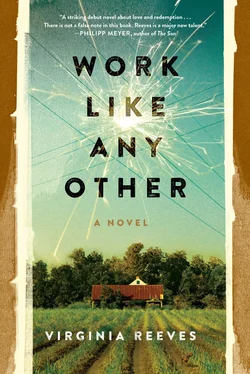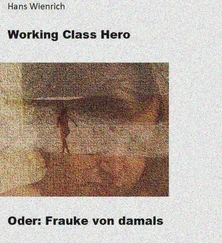Even in that moment, Marie did not come.
I’m up for my first parole hearing today, which means it’s been four years since I came here. There isn’t sense in this number. Four is the age Gerald was when he started reading. It’s a number on a chart in Marie’s old classroom. It’s bars on my cell window and scratches in the dust in the yard and attempted escapes this year. I can picture those fours. But as years made up of weeks and days, I can’t fit that number to my time in this place. It is both too much, and not nearly enough. I have always been here, but I have also just come.
Ed has had one hearing already, and the chair assignment and furlough happened soon after. I know his chair still hasn’t been wired, and I’m hopeful it will be the job that grants my own furlough. I’ve told myself they didn’t come to me with the wiring because they weren’t ready, so I’m prepared to go to them now. I will trade those lives cut short by electrocution for my freedom. If Ed hadn’t built the chair, someone else would’ve. If I don’t wire it, they’ll give it to someone else. The State will have their chair. We can’t stop that.
The parole board meets in the administration building, and two guards lead me through a covered walkway that connects it to the main cell house. Other guards open and close gates and mesh doors for us as we pass.
“Another hopeful, huh?”
“What? No packed bags?”
The ones that know me call me by name.
“I bet the board’ll let you go today, Martin!”
“No good-byes for me, Martin? We’ll probably never see you again.”
My escorts join in the laughter, but don’t add their own comments.
We enter a diamond-shaped lobby, the front doors directly across from us. I know the lighthouse is just past them, and the oak grove past that.
The parole board meets in a room at the southwest corner of the diamond, its presence clearly announced by an etched placard on the wall. Frosted-glass doors close off the east end, and I can hear voices behind them amid the snap and click of typewriters. It’s peculiar to be around such foreign noise, given off by secretaries in offices or clerks at a bank.
“This way,” one of my guards says, nudging me forward.
He knocks on the door, and a mild voice tells us to enter. One of my guards stays outside, and the other accompanies me in.
The room is sparse, but the windows are tall, and they are not barred or screened. I can see the front guard tower, there in its nautical moorings. If these three men behind their long oak table grant me parole today or give me a furlough, I will go to the ocean. I am sure of it. I’ll find a lighthouse like this one and become its occupant, lighting my lantern in the dark to keep ships from danger.
Or, if Marie would allow it, I’d go home.
“Sit down, please,” one of the men says.
A single wooden chair faces them, vulnerable and open. I feel like a child as I sit, unsure of what to do with my hands. I start with them flat on my thighs and then shift to crossing them over my body.
“Roscoe T Martin,” the man in the middle says. He is balding at his temples, and the hair he still has is a mustard yellow, thin and stringy. As though to compensate, his eyebrows run out from his brow in two great hedgerows. His suit is dark blue. The men on his sides are dressed in the same color. His voice is the same mild one that called us in. It sounds either patient or drained, but not both. “You are here for your first parole hearing?”
“Yes, sir.”
“You understand that we are not here to determine your innocence or guilt, and that we accept as fact the guilty verdict imposed on you by the State of Alabama?”
“Yes, sir.”
“The purpose of this parole hearing is to determine whether you can return to society without endangering public safety.” He pauses as though he’s asked another question, and I am readying to say, Yes, sir, when he continues, “We take several factors into consideration when making this decision, Mr. Martin, including your intake evaluations, behavior while incarcerated, vocational and educational accomplishments during incarceration, and plans you have were you to be released. Does this make sense to you, Mr. Martin?”
“Yes, sir.”
“Very well.” He opens a folder that’s in front of him, and I think of everything it must say about me, all of the history they took when I came. “We will start with a review of your crime.”
Ed told me this was where they would start. I have reviewed my crime many times. I review my crime every day.
“Mr. Martin, you were convicted on two separate counts—larceny and manslaughter. For larceny, you were given a sentence of ten years.”
“Yes, sir.”
“For the count of manslaughter, you were sentenced to twenty years. I see you were given concurrent sentences, which puts you at a combined sentence of ten to twenty years.”
“Yes, sir.”
“Gentlemen,” the balding man says to the other two men, “anything else you’d like to add?”
They shake their heads.
“I’ll start with my questions about the central file, then. Please contribute as you like.”
The men nod, and I put my hands back on my legs, my back impossibly straight against the rungs of the chair.
The balding man says, “I see that you were assigned to the dairy. How is that?”
“Very good, sir.”
“Do you feel well suited to the work?”
“Yes, sir.”
The man on the left says, “Do you think you could carry on this work outside the prison?”
“I do, sir. My family has a farm, and I could increase its productivity by adding a small herd of dairy cows to the existing crops and livestock.”
The man on the right says, “You wouldn’t want to return to electrical work?”
I wait too long to answer, and the man in the middle marks something down in my folder.
“I’m trained as an electrician. If there was electrical work, I’d—”
“That’s quite all right, Mr. Martin,” the balding man says. “I see you’re also doing some work in the library. Do you find that rewarding?”
“Yes, sir.”
“Why?” asks the left.
“I enjoy reading, sir, and I like to be around the books.”
“Can you see yourself carrying any of the skills you’ve acquired in the library to your civilian life?”
“Yes, sir. My father-in-law left us a large library, and I would like to organize it using the same system we use here.”
“Yes, but can you see yourself gainfully employed in this field?” asks the right.
“If there was a position close by, sir.”
Balding makes another note in my file. “Any other questions, gentlemen?”
The two others shake their heads again, no.
“If you were paroled now, Mr. Martin, what would your plans be for reentering society?”
“I would return to my family, sir, and help them work the farm.”
“You wouldn’t seek electrical work?”
“No, sir.”
“Just a moment ago, you said you would return to electrical work if there was something available.”
I think of those streetlamps, the dam, the turbines. Poles and crossarms, insulators and wires. And those are only the wrappings and containers. Inside them is that great electrical force I’ve spent so much of my life studying. I know that here in Kilby I have lost it, but how could I not at least try to return to that work once I escape these walls?
“Mr. Martin?”
I see Wilson standing on the ground below me while I connect our own wires to the binder on Alabama Power’s lines. I think of what he said.
“It’s what I do, sir — electrical work.”
Читать дальше












